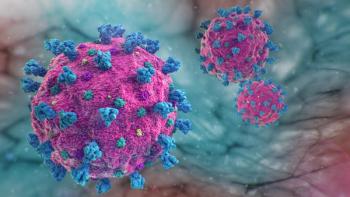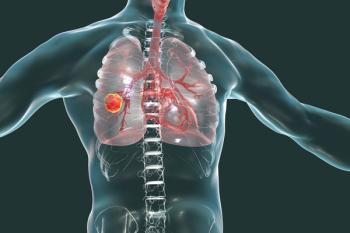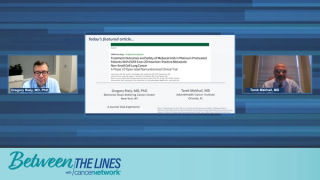
Lung Cancer
Latest News

Latest Videos

CME Content
More News

This study created and assessed a parsimonious radiomic model that was able to identify a vulnerable subset of screen-detected lung cancers that are associated with poor outcome.

The FDA granted breakthrough therapy designation to osimertinib for the adjuvant treatment of patients with early-stage epidermal growth factor receptor-mutated non-small cell lung cancer after complete tumor resection with curative intent.

The study is evaluating poziotinib in patients who were previously treated for non-small cell lung cancer with HER2 exon 20 insertion mutations.

Though a significant shift in coverage frameworks was detected in this study, future research should continue to monitor coverage and its possible impact on test utilization.

The expert from the Fox Chase Cancer Center discussed a paper recently published regarding alternative multidisciplinary management options for patients with NSCLC during the COVID-19 pandemic.

The deep learning survival neural network model demonstrated the potential to provide personalized treatment recommendations based on real clinical data in patients with non-small cell lung cancer.

Patients with chemotherapy-naïve, locally advanced, or metastatic non-small cell lung cancer who were treated with tiragolumab plus an anti-PD-L1 agent showed better efficacy versus single-agent checkpoint inhibitor therapy alone.

The findings support ctDNA testing in patients who are undergenotyped at the time of diagnosis and as a primary option at the time of progression on targeted therapies.

Fam-trastuzumab deruxtecan-nxki (Enhertu) showed favorable clinical activity with a high objective response rate and durable responses in patients with HER2-mutated non-small cell lung cancer.

The study demonstrated modest survival benefits in patients with extensive-stage small cell lung cancer who received the combination of pembrolizumab and etoposide plus platinum (EP).

The addition of durvalumab to standard chemotherapy continued to demonstrate an improvement in overall survival for patients with treatment-naïve extensive-stage small cell lung cancer.

Combining tislelizumab with chemotherapy improved progression-free survival compared with chemotherapy alone as a frontline treatment in Chinese patients with advanced squamous non-small cell lung cancer.

Patients enrolled in this open-label trial have p53-mutated extensive disease small cell lung cancer (SCLC) and are being treated with second-line topotecan following administration of ALRN-6924.

Tepotinib demonstrated durable clinical activity in patients with locally advanced or metastatic non-small cell lung cancer who harbor a MET exon 14 skipping mutation identified through liquid or tissue biopsy.

The updated findings indicated that alectinib demonstrated a clinically meaningful improvement in overall survival compared with crizotinib in patients with ALK-positive non-small cell lung cancer.

In this examination of 102 patients with lung cancer and COVID-19, researchers found that COVID-19 is associated with high burden of severity in this patient population.

This study found that cancer screening decisions among older adults with limited life expectancy were not always informed or intentional and were subject to multiple complex factors.

The FDA approved lurbinectedin for the treatment of adult patients with metastatic small cell lung cancer under accelerated approval based on overall response rate and duration of response in a phase 2 study.

Roy S. Herbst, MD, PhD, of the Yale Cancer Center discussed the future of lung cancer treatment to follow the phase III ADAURA trial regarding osimertinib as adjuvant therapy to treat NSCLC presented at the 2020 ASCO Virtual Scientific Program.

In this retrospective cohort study, the use of immune checkpoint inhibitors among patients with advanced NSCLC with negative, low, or untested PD-L1 expression was found to have increased over time.

The FDA approved ramucirumab injection in combination with erlotinib for the first-line treatment of patients with metastatic non-small cell lung cancer with EGFR exon 19 deletions or exon 21 mutations.

Payment models with shared-savings components, such as the Oncology Care Model, may be associated with fewer visits and lower costs in certain cancer settings in the first year.

The FDA approved the use of nivolumab plus ipilimumab given with 2 cycles of platinum-doublet chemotherapy as a first-line treatment for adult patients with metastatic or recurrent non-small cell lung cancer.

This study suggested that Medicaid expansion could have survival benefits for men with non-small cell lung cancer, however the same association pattern was not observed for women.

The FDA has approved brigatinib for the first-line treatment of patients with ALK-positive metastatic non–small cell lung cancer, as detected by an FDA-approved test.








































